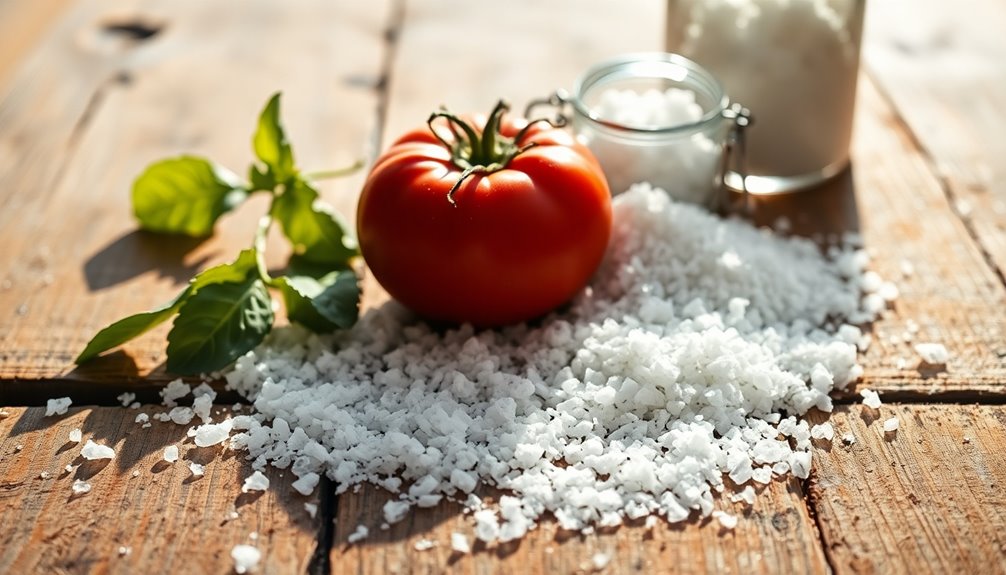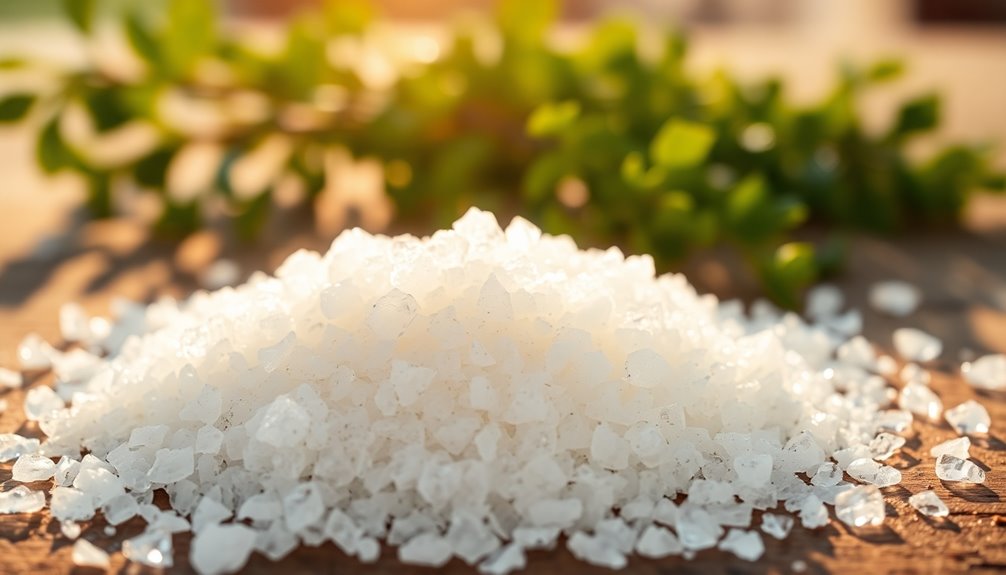You embody the essential roles of salt and light, preserving goodness and illuminating truth in a world that often veers into darkness. Salt symbolizes your ability to counter moral decay, while light represents the guidance you provide others. Through your good works, you reflect God's glory and show the world the path to truth. Each small act of kindness can create a ripple effect, encouraging others to join this mission. By embracing your role as salt and light, you influence your community positively. There's much more to explore about how you can fulfill this calling and its impact on your life.
Key Takeaways
- Salt symbolizes preservation and positive influence, urging believers to counter societal evils through good works and moral integrity.
- Light represents guidance and truth, illuminating the path for others and reflecting Christ's teachings in daily life.
- Believers are called to actively engage in their communities, demonstrating faith through acts of kindness and service.
- The biblical metaphor of salt emphasizes the need for believers to maintain their effectiveness and avoid complacency in their faith.
- Resources like BibleGateway.com provide tools for deeper understanding of the roles of salt and light in the believer's life.
Introduction

When you think about the impact of your faith, consider the powerful metaphors of salt and light that Jesus shared in His Sermon on the Mount. Salt, a symbol of preservation and flavor, represents the essential role you play in countering societal evils. As a Christian, your influence helps preserve moral values and enhances goodness in a world that often strays from them.
Light, on the other hand, signifies guidance and truth. Through your good works, you illuminate the path for others, acting as a beacon of hope and integrity. It's not just about living a good life; it's about being visible and demonstrating your faith publicly.
The call to be salt and light means you're not only responsible for your personal integrity but also for the communal witness of believers. Together, you can maintain a distinct presence in the world, actively showcasing your faith through actions that reflect Christ's teachings.
Embracing these metaphors encourages you to understand your vital role in shaping a better world, one that reflects the love and values of Christ in every interaction.
Biblical Context of Salt Light

In the Sermon on the Mount, Jesus paints a vivid picture of what it means to be the "salt of the earth" and the "light of the world."
These references highlight your role in preserving goodness and guiding others in a challenging environment.
Let's explore both primary and secondary Bible references that enrich this vital teaching.
Primary Bible References
The metaphors of salt and light in Matthew 5:13-16 serve as powerful reminders of the roles believers play in the world. In verse 13, Jesus calls you the "salt of the earth," highlighting your duty to preserve moral integrity and enhance goodness in society. Just as salt prevents decay, your presence can help maintain righteousness in a morally challenging environment. If you lose your flavor, you risk becoming ineffective in your mission.
Moving to verses 14-16, you're referred to as the "light of the world." This calls you to shine brightly and guide others through your good works, reflecting the glory of God. The imagery of a "city on a hill" signifies the visibility of your faith, encouraging you to let your light shine in a world that often feels dark.
Secondary Bible References
Exploring secondary Bible references deepens your understanding of the metaphors of salt and light. In Mark 9:50, Jesus warns that if salt has lost its saltiness, it's no longer good for anything. This serves as a reminder for believers in Christ to maintain their positive influence in the world. Just as salt preserves food, you're called to preserve the values of the Kingdom.
In John 8:12, Jesus declares, "I am the light of the world." He emphasizes that you should let your light shine before men, reflecting His truth and guidance. This aligns with 1 Peter 2:9, which calls you to declare God's excellencies, showcasing the transformation from darkness to light as a vital part of your spiritual responsibilities.
Colossians 4:6 also highlights the importance of communication, urging you to speak graciously and with salt. This reinforces the need for believers to embody the commandments of Christ in your interactions, promoting peace and love among each other.
Ancient Trade Routes and Salt

Value shaped ancient trade routes, with salt standing out as one of the most coveted commodities. These routes, like the Silk Road and the Roman Empire's network, facilitated the crucial transportation of salt, essential for food preservation and enhancing flavor.
In ancient economies, salt held immense value, even serving as a form of currency. The term "salary" originates from "salarium," payments made to soldiers for purchasing salt, highlighting its importance.
The "Salt Roads" in North Africa connected the Sahara's salt mines to West Africa, significantly impacting local economies and trade dynamics. Caravans would transport salt blocks weighing up to 200 pounds, illustrating salt's vital role in trade.
As demand for this essential resource grew, it influenced trade patterns and led to the establishment of cities and settlements along these routes. Merchants and travelers sought reliable sources of salt, driving economic growth.
In essence, salt was more than just a seasoning; it was a key player in shaping ancient trade routes, facilitating commerce, and contributing to the prosperity of civilizations.
Understanding the significance of salt in trade helps you appreciate its profound impact on history and human society.
Cultural Significance of Salt

Throughout history, salt's profound cultural significance has resonated across various societies, shaping traditions and values. For many, it's much more than a seasoning; it symbolizes value and purity. In ancient cultures, salt served not only as a critical tool for food preservation but also as a form of currency, underscoring its worth in daily life. You might recognize phrases like "worth one's salt," which reflect this deep-rooted appreciation.
Cultural rituals often incorporate salt as well. In Hindu ceremonies, salt plays a vital role, while in ancient Greek culture, it represents hospitality and friendship. When you share a meal seasoned with salt, you're participating in a tradition that honors connection and warmth.
Moreover, salt's therapeutic properties are acknowledged across cultures, leading to its use in healing practices. Salt baths and inhalation therapies have been employed to address respiratory issues, highlighting its importance in wellness.
Misunderstanding Salt's Preservation Role

You might think of salt solely as a seasoning, but its preservation role goes much deeper.
Misunderstanding this aspect can lead to complacency in your faith, causing you to overlook the importance of maintaining moral standards.
Let's unpack some common misconceptions about salt's true value and its significance in your life as a believer.
Debunk Common Misconceptions
When it comes to salt's role as a preservative, many people misunderstand how it actually works. You might think that salt alone prevents spoilage, but that's not entirely true. Salt creates a hypertonic environment that inhibits harmful microorganisms by drawing moisture out of food. This dehydration helps extend the shelf life of perishable items, making it a vital tool for food preservation, especially before refrigeration.
Another common misconception is that all salt is the same. In reality, different types of salt—like kosher, sea, and table salt—vary in their preservative qualities and uses. While salt enhances flavor, its preservation properties are crucial in processes like curing meats and pickling vegetables. Here, salt not only adds taste but actively prevents spoilage and maintains food safety.
Understanding these aspects of salt can help you appreciate its true value in food preservation. So next time you reach for salt, remember it's not just about flavor; it's also about creating the right environment to keep your food safe and delicious.
Misinterpretation of Salt's Value
Misunderstanding salt's value often leads to a diminished appreciation for its vital role in both food preservation and moral integrity. Many people view salt merely as a flavor enhancer, neglecting its biblical significance as a preservative against moral decay.
When Jesus called believers the "salt of the earth," He highlighted your essential function in maintaining spiritual integrity and combatting societal evil.
However, when Christians lose sight of their purpose, they risk becoming like salt that loses its saltiness. This misinterpretation of salt's value can breed complacency, causing you to blend in with a world corrupted by sin rather than standing as a beacon of truth.
Your humble obedience is crucial; it empowers you to serve as preservatives to the world, actively influencing your community for good.
Everyday Choices and Influence

Your everyday choices shape how you interact with others and can significantly influence your community.
By engaging in small acts of kindness or choosing honesty in tough situations, you embody the essence of being salt and light.
These daily decisions not only reflect your values but also inspire those around you to do the same.
Daily Interactions With Others
Daily interactions can be pivotal moments for believers, offering countless opportunities to embody the essence of "salt and light." Every choice you make—whether it's showing kindness in a conversation or choosing integrity in challenging situations—can influence those around you. By demonstrating kindness, you preserve moral values and enhance the atmosphere of your community.
When you engage in good deeds or display honesty, you act as a guiding light in a morally ambiguous world, leading others toward righteousness and truth. Your gracious speech can be seasoned with salt, encouraging others to reflect on their own actions.
Handling conflicts with grace or showing generosity can either strengthen or dilute your witness. It's essential to be consistent in living out your faith, as your actions create a ripple effect. Each act of love and mercy not only fulfills your calling to be salt and light but also inspires others to embrace Christ's love in their lives. Additionally, the importance of open communication can help resolve misunderstandings and foster deeper connections in your interactions.
In every daily interaction, remember that you have the power to influence positively. Let your choices reflect the essence of who you're as a believer, guiding others through your example of kindness and integrity.
Community Engagement Strategies
Living out your faith extends beyond individual interactions; it encompasses how you engage with your community as a whole. One vital way to do this is through community service. Volunteering at local charities not only enhances the well-being of those around you but also exemplifies the "salt" metaphor—preserving and nurturing your community.
Supporting local businesses over larger corporations contributes to economic growth, acting as a beacon of "light" that fosters connection and belonging.
Advocating for social justice and participating in local activism can significantly amplify your influence. It helps preserve moral standards while addressing pressing societal issues. When you host or participate in community events, like clean-up days or food drives, you showcase your faith's "light," inspiring others to join in making a positive impact. Additionally, engaging in activities like aquatic exercise at community pools can promote wellness and togetherness among residents.
Moreover, making conscious choices in your daily interactions—like speaking kindly and listening actively—reflects the qualities of "salt and light." This intentionality fosters a compassionate atmosphere, encouraging understanding and unity.
Impact on Modern Believers

The call to be "salt and light" profoundly shapes the lives of modern believers, urging them to engage actively with their communities. As the "salt of the earth," you're tasked with preserving moral values and enhancing the positive aspects of society. This means you should reflect the flavor-enhancing properties of salt by standing firm in your spiritual integrity. If you lose your "saltiness," your influence in today's culture diminishes.
Being the "light of the world" also compels you to visibly demonstrate your faith through good works. Just like a city on a hill, your actions can guide others and point them toward God. Engaging in community service and outreach showcases your faith in action, ultimately aiming to glorify your Father rather than yourself.
Your commitment to being salt and light serves as a powerful reminder to confront societal challenges. In an increasingly dark and morally ambiguous world, you have the opportunity to spread hope, truth, and love.
Additional Resources

For those seeking to deepen their understanding of being salt and light, a wealth of resources is available to guide your journey. BibleGateway.com is a fantastic starting point, offering a variety of Bible study materials that delve into the themes of salt and light as taught in the Sermon on the Mount. You can explore devotionals, reading plans, and insightful articles that emphasize genuine discipleship.
The platform allows you to access commentaries from respected leaders like John Stott and Dietrich Bonhoeffer, helping you grasp the significance of your role in the world. Use the search functionality to find specific verses, such as Matthew 5:13-16 and Mark 9:50, which can enhance your reflection on these vital concepts.
Additionally, BibleGateway.com supports advanced tools for comparing different translations of scripture, enriching your understanding of the metaphors of salt and light. Engage with others through community features like forums and discussion boards, where you can share experiences and insights about living out your faith.
With the guidance of the Holy Spirit and God's Word, you'll be empowered to shine brightly in your community.
Frequently Asked Questions
What Did Jesus Mean by Salt and Light?
When Jesus talks about salt and light, He's emphasizing your role in the world.
You're called to preserve moral integrity and add value to life through your actions. By embodying truth and righteousness, you illuminate the path for others.
It's about living authentically, showcasing your faith in a way that inspires those around you. Your good deeds should reflect God's glory and encourage others to seek the same light in their lives.
What Bible Verse Says Salt and Light?
The Bible verses that mention salt and light are found in Matthew 5:13-16.
In these verses, Jesus describes believers as the salt of the earth and the light of the world. He emphasizes the importance of being distinct and visible in your faith.
You're called to let your good works shine, making an impact in your community and glorifying God through your actions.
This teaching encourages you to embrace your role in the world.
What Is the Moral Lesson of Salt and Light?
The moral lesson here revolves around your responsibility to embody goodness and truth in a world that often lacks integrity.
You're called to maintain your distinctiveness, ensuring that your actions reflect your values. When you shine your light, you guide others and inspire them to seek righteousness.
What Does Salt Symbolize Spiritually?
Salt symbolizes preservation and purity in a spiritual sense. It represents your role as a guardian against moral decay and a force for good in the world.
When you embody this symbolism, you enhance the flavor of life around you, adding joy and goodness.
Additionally, salt signifies faithfulness and commitment, reminding you to nurture your relationships with God and others, fostering peace and healing in your community.










